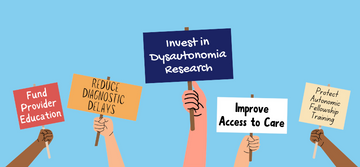Why Black History Month Should Feature More Stories on Disability and Chronic Illness
Feb 01, 2023

Vitassium welcomes guest posts from those in our community. Today, we are thrilled to feature a guest post authored by Natasha Graves, MPH, MBA, CHES, patient advocate and Founder and CEO of VacayAbility. Vitassium supports Natasha’s mission to build awareness and advocate for treatment options among underrepresented communities.
While it is no secret that chronic illness plagues all races and ethnicities in the United States, people of color face higher rates of diabetes, obesity, stroke, heart disease, and cancer than whites, as well overall worse health outcomes. In addition to higher rates of chronic illness, lower wages, geographical location, lack of representation in healthcare, and insufficient insurance coverage among people of color greatly limits access to treatment.
As my own journey of inequity in my POTS diagnosis and treatment has shown, racial discrimination in healthcare is aserious and far reaching problem Doctors often dismiss symptoms, refuse to offer treatments, forgoing tests and missing diagnoses more often in people of color. This discrimination contributes to the inequalities that have left people of color with unbelievable health disparities.
Unfortunately, Black people with disability and chronic illness not only encounter this racism in healthcare, we experience the double whammy of racism and ableism. The world wasn’t built with people with disabilities in mind, and because of that, the world we live in is inherently “ableist” or discrimination of and social prejudice against people with disabilities based on the belief that typical abilities are superior.
In the U.S., we rarely learn about Black history and contributions to society in the public school system, similar to disability history. However, Black history and disabled history are intertwined. The disability rights movement took cues from the civil rights movement and implemented some of the same methods of peaceful protest to fight for equal rights.
The social stigma around disability is so omnipresent that numerous black celebrities and icons have chosen not to disclose their disabilities and chronic illnesses out of shame, the perception of weakness, and fear of not booking any more jobs.
What can you do this Black History Month?
Honor the legacies of disabled Black history icons and Black history makers as an ally or as a means to stand against ableism and racism that plague our identities as someone Black with a disability or chronic illness.
There is a wide range of icons you can learn about including:
- Henrietta Lacks: woman whose cervical cancer cells were unknowingly stolen and used at the first immortalized human cell line (HeLa cells)
- Missy Elliott: rapper, singer, songwriter and producer who has the autoimmune disease, Graves’ disease
- Harry Belafonte: Grammy award winning singer, actor, Tony award winner and activist who has dyslexia.
- Solange: Singer, songwriter and creative who has revealed she has dysautonomia and an autoimmune disease
- Muhammad Ali: champion boxer, racial and social justice advocate who was diagnosed with Parkinson’s at age 42
- Maya Angelou: writer, poet, singer, and civil rights activist who had selective mutism for five years
- Toni Braxton: Grammy award winning singer who has Lupus
- Harriett Tubman: former slave turned abolitionist who acquired a TBI as a result of slave violence which caused epilepsy
- Venus Williams: tennis superstar who has an autoimmune disease, Sjogren’s
- Halle Berry: model and actress who has Type I diabetes







